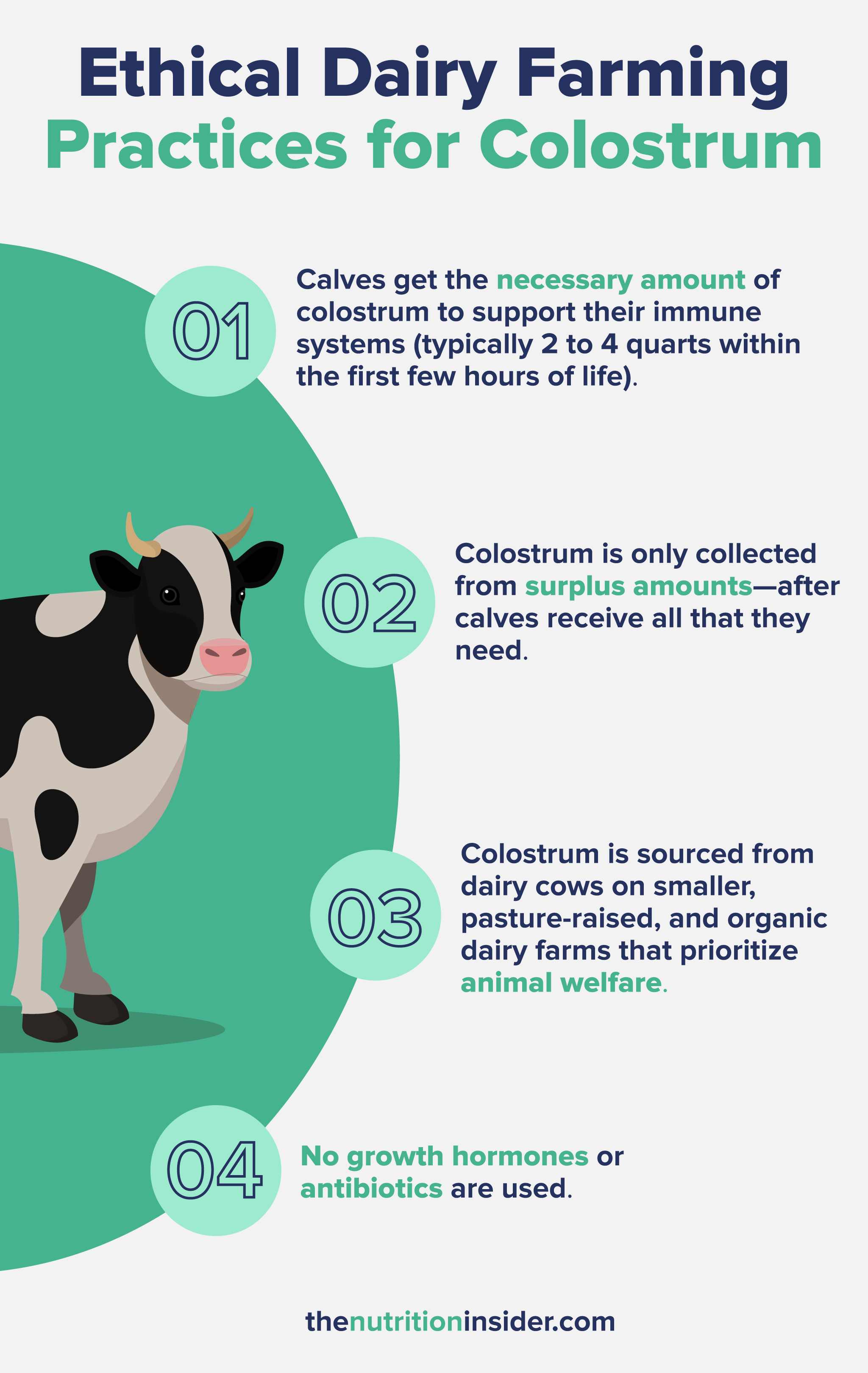Is Bovine Colostrum Ethical?
Evidence Based Research To fulfill our commitment to bringing our audience accurate and insightful content, our expert writers and medical reviewers rely on carefully curated research.
Read Our Editorial Policy
Colostrum supplements have exploded in popularity on social media in recent years—but many people don’t fully understand what colostrum is or how it’s produced.
Essentially, bovine colostrum is a nutrient-dense fluid produced by cows in the first few days after giving birth, packed with antibodies, growth factors, and other bioactive compounds.
While these supplements boast a wide array of gut and immune benefits, they also raise a major (and valid) ethical concern: Are they depriving newborn calves of a vital source of nutrition?
For a TL;DR answer: bovine colostrum supplements can be ethical—as long as proper “calf-first” policies are strictly in place.
In this article, we’ll dive into the pros and cons of taking bovine colostrum supplements, along with the ethical dilemmas surrounding their production.
What Is Bovine Colostrum?
As any postpartum mother knows, colostrum is the first form of milk produced after giving birth, typically in the first 2 to 5 days before mature breast milk comes in—and while there are differences in nutritional composition, colostrum serves a similar purpose whether it’s coming from a human or a cow.
Unlike breast milk, which is much more fluid, colostrum is thicker, yellowish, and often sticky. Some mothers see colostrum come through in the third trimester, while others don’t have it appear until after giving birth.
Potential ick factor aside, colostrum is incredibly nutrient-concentrated and beneficial—so much so that it’s sometimes referred to as “liquid gold” or “first milk, perfectly designed for a newborn’s tiny, marble-sized stomach.
It provides newborn infants with antibodies, growth factors, fats, proteins, carbohydrates, micronutrients, and enzymes that support:
- Immune system function
- Muscle and tissue growth (especially in preterm infants)
- Gut health and digestion
- Prevention of jaundice
- First bowel movements (meconium passage or a baby’s first poop)
Bovine colostrum is similar to human colostrum, with the main and obvious difference being that it comes from lactating cows who just gave birth instead of humans.
In dietary supplement form, bovine colostrum is pasteurized before being dried into pills or powders that can be mixed with liquids. Like human colostrum, bovine colostrum is also yellow in color, often resembling buttermilk. Although most studies have focused on the benefits of colostrum for infants (the intended population for colostrum), recent research has shown that colostrum supplements may also benefit adults, including immune function, gut health, and athletic performance.
How Is Bovine Colostrum Produced?
So, we know how human mothers produce colostrum, but how is bovine colostrum produced?
Well, pretty similarly—bovine colostrum is collected from dairy cows within the first 24 to 48 hours after they give birth.
Here’s a breakdown of the typical process of collecting colostrum for human use:
- After a cow gives birth, she naturally produces colostrum for a few days.
- Dairy farmers should ensure that newborn calves receive all the colostrum they need to thrive (this is considered a “calf-first” policy).
- The excess colostrum not consumed is collected during regular milking sessions.
After collection, processing methods include pasteurization to eliminate harmful bacteria, and many companies use cold-chain pasteurization to preserve the beneficial bioactive compounds. Then, it’s spray-dried or freeze-dried into a powder and either sold as a powder or made into capsules or other products.
Is Bovine Colostrum Ethical?
The main ethical concern is how much colostrum is taken for supplements and whether enough is left for the newborn calves.

Popular brands like ARMRA claim to only use surplus colostrum for their supplements, collected after baby calves finish feeding and receive all the nutrients they need.
However, some argue that this practice is still ethically questionable.In humans, lactating mothers typically produce just the right amount of colostrum to meet their baby’s needs. Similarly, cows produce colostrum tailored to nourish their newborn calf—so in theory, that calf should be the intended recipient of everything its mother produces.
However, in dairy farming, cows often produce more than one calf requires. Farmers sometimes collect and store this excess colostrum for future use, suggesting that under certain conditions—like selective breeding or frequent milking—cows can produce more colostrum than their calf strictly needs.
But this balance can be disrupted in large-scale factories or industrial farms, where profit-driven priorities may come before calf health. In some cases, this could mean calves don’t receive adequate colostrum. As the popularity of colostrum supplements increases, the number of lower-quality and unethical brands on the market can also rise.
Plus, according to the Institute of Agriculture and Natural Resources at the University of Nebraska-Lincoln, the number of calves in North America that do not receive adequate colostrum ranges from 11% to 31%. That said, this is a broader issue in dairy farming, not specifically farms for sourcing colostrum.
How to Know If Colostrum Supplements Are Ethical
If you take bovine colostrum, ensure that the brand describes how their colostrum is gathered and see that it is third-party tested.
Ethical dairy farming practices for colostrum should ensure that:
- Calves get the necessary amount of colostrum to support their immune systems (typically 2 to 4 quarts within the first few hours of life).
- Colostrum is only collected from surplus amounts—after calves receive all they need.
- Colostrum is sourced from dairy cows on smaller, pasture-raised, and organic dairy farms that prioritize animal welfare.
- No growth hormones or antibiotics are used.
The most popular colostrum brand today, ARMRA, appears to meet these specifications. They source colostrum from grass-fed, non-GMO, hormone-free, antibiotic-free, family-owned dairy farms that undergo strict standards for animal welfare—which is exactly what to look for in a high-quality colostrum supplement.
In their own words, ARMRA only uses “overflow colostrum, the surplus remaining after the calves are fully fed to receive all the vital nutrients they need. Typically, this surplus is discarded as an industry waste product; instead, ARMRA upcycles it to ensure the calves’ needs come first and no colostrum goes to waste.”
The Bottom Line
Just like there is a wide difference between factory-farmed industrial beef and grass-fed, pasture-raised beef on a small family farm, the same applies to bovine colostrum supplements—some are sourced more ethically than others.
Ultimately, the ethics of consuming bovine colostrum, like drinking cow’s milk, come down to your personal beliefs about animal welfare. It’s important to know that not all colostrum brands follow ethical sourcing practices. To make the most responsible choice, look for brands that prioritize calf welfare, transparent sourcing, and ethical farming practices, as outlined above.
FAQs on the Ethics of Colostrum
Can bovine colostrum be ethically sourced?
Yes, bovine colostrum can be ethically sourced. Requirements include sourcing from a “calf first” farm, ensuring that newborn calves receive all the colostrum they need first, only collecting the surplus.
Ethical colostrum brands should also provide third-party testing and be sourced from (ideally) smaller family farms with grass-fed, pasture-raised cows with no antibiotics or hormones. Industrial, factory dairy farms are unethical for many reasons, and colostrum should not be sourced from those establishments.
That said, this depends on your definition of “ethical” (meaning, if you think drinking cow’s milk is 100% unethical, you will have the same views about colostrum). this
Is bovine colostrum legit?
Bovine colostrum is most known for supporting immune function and gut health. It may reduce the risk of upper respiratory tract infections, prevent intestinal permeability, and reduce symptoms of inflammatory bowel disease.
Research has suggested that it promotes muscle recovery or lean body mass, including increasing strength in older adults. That said, much of the colostrum research has been done in infants, and more research with adults is still needed.
Should humans take bovine colostrum?
Despite the potential benefits of colostrum, that doesn’t necessarily mean you should take it—that’s something to talk about with your healthcare provider to determine if it’s the right approach for you.
Plus, some people should not take colostrum, including people who are allergic to dairy. You may also want to avoid bovine colostrum if you have hormone-sensitive cancer (i.e., breast, ovarian, endometrial, etc.) because of the trace amounts of estrogen in colostrum. When in doubt, talk to your doctor to make an informed choice.








